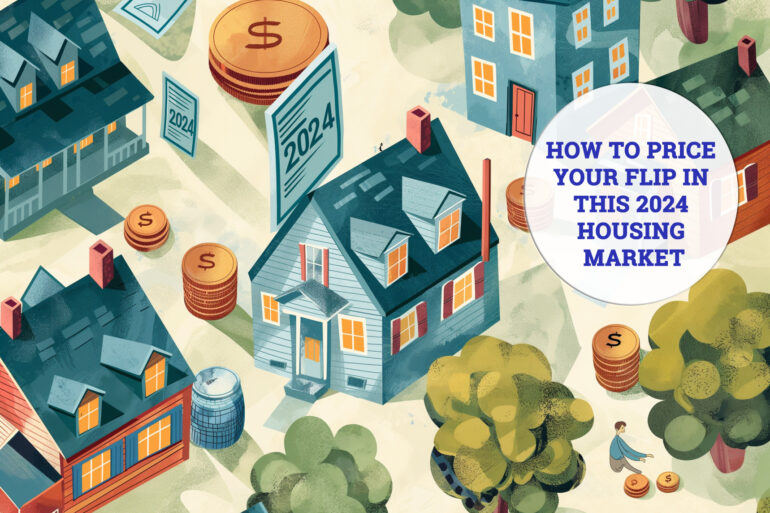How to Price Your Flip for the 2024 Housing Market
The 2024 Housing Market is going to be a bit different. Real estate flipping is a time-sensitive business. Many investors take out short-term loans with interest-only payments in the beginning, hoping to sell the property within two years.
However, a slowing housing market can challenge liquidity and force flippers to sell their properties at lower prices. Consumers have been feeling economic pressure and have cut back on discretionary goods, groceries, and home improvements.
Every real estate investor wants to price their property for maximum returns in 2024, but setting the price too high can scare away potential customers. Sellers need to strike a reasonable balance, and this guide will offer suggestions on how to price your flip during a potential recession.
Monitoring macroeconomic factors can help investors detect worsening conditions or recoveries in advance.
Compare Other Listings in the Area
In any economic environment, real estate investors should compare similar properties selling in the area. If two properties have the same square feet and perks, the house with the lower price will likely generate more demand.
Potential buyers will look at several homes in your area. They will compare prices based on square feet, the school system, nearby amenities, and other factors.
If other real estate investors in the area have cut their listing prices by 10%, you may have to follow suit and lower your price. It can turn into a race to the bottom, but if lower prices attract buyers and turn the tide, the sellers can gain more control and raise their prices.
Real estate investors should consider the lowest amount they are willing to sell their property. They should also assess if they can handle the consequence of no one purchasing the property at the set price. Some home flippers can wait a few years to sell a property, while others cannot wait over a year because the introductory interest-only payments will end, and they are forced into the 2024 housing market.
Assess Local Demand
Trends in local demand can tip off investors on how the market may move in the future. Recent home sales reveal the prices people have paid for similar homes in your area. However, you can also benefit from tracking the average days a property spends on the market as a good indicator of how the market will act in 2024.
If properties are staying on the market longer, it can be a sign that demand is waning. Sellers may have to price their properties at discounts to make them more liquid, but some flippers can wait. Trends can worsen and lead to reduced demand and lower price points.
Investors can look at these metrics and try to detect a recovery before other real estate investors notice. If there is an uptick in demand, housing prices will go up. Something subtle, like fewer average days on the market, can indicate a market recovery before it takes form.
It’s important to remember that not every investment is profitable.
Monitor Macroeconomic Factors
Home buyers will only purchase what they believe is fair and within their budget. Macroeconomic conditions and the cost of living help sellers understand how the average home buyer’s spending habits have changed and will further change in 2024.
Interest rates have been the focal point for macroeconomics. Higher interest rates brought mortgage demand to levels not seen since 1995. Demand has rebounded slightly since that reading and hit a five-week high in November. The Fed has not raised interest rates since May, and a decision to reduce interest rates can reignite demand in 2024’s market.
Many retailers have expressed concerns about an economic slowdown in 2024, which can translate into fewer people able to buy homes at the current prices. Real estate investors should also monitor the freight market, which is currently in a recession, to gauge macroeconomic conditions. If truckers make less money on the same deliveries, it means fewer companies are making orders and filling up trucks.
Monitoring macroeconomic factors can help investors detect worsening conditions or recoveries in advance. They can then price their properties strategically. An investor anticipating a recession may want to avoid getting too greedy and opt for a sufficient profit. An investor who believes the market will recover may want to hold out and set a higher price for their flip. Investors still have to consider their financing and when the introductory low payments give way to higher monthly payments.
Not Every Investment Is Profitable
It’s frustrating to put over a year of effort into fixing up a home and making it look nice, only to sell it for a loss. Home flippers who bought at high prices may have to accept this possibility. It’s important to remember that not every investment is profitable. Real estate investors optimize their investments and do their research to increase their probability of generating profits.
Getting out of a house flip at a small loss can shield you from higher losses if a recession becomes more widespread. Some investors can weather the turbulence, while others must sell the property to avoid further losses or a possible foreclosure.
Consider Waiting Out a 2024 Recession
Some investors prefer to wait out a recession. While housing prices will fall during a recession, people still need a place to live. House flippers can use two strategies to wait out a recession and increase their gains.
The first strategy is more realistic for many investors. They can rent out the property and wait for the market to recover. The rent payments may not be enough to cover the mortgage payments, but you can reduce your total expenses by generating extra income. Flippers can also consider refinancing their mortgages to make them more friendly for a long-term investment.
Investors can also consider living in the property while working on a flip. This strategy commonly known as “House Hacking” is less practical for investors with multiple properties in their portfolios who want to stay at their current home. However, if you live in a property that you’ve been flipping for at least two of the past five years, you don’t have to pay capital gains on the first $250,000 in profit (or $500,000 if you are married and filing jointly).
Looking ahead, the 2024 housing market will see plenty of opportunity.
Only Get into a Flip When You See an Opportunity
Millions of homes are listed throughout the United States. Realtor lists over 230,000 homes throughout the Sunshine State. However, the vast number of listings does not ensure profits for flippers.
Real estate flippers operate under tight schedules and margins. Sometimes, it is better to watch as a spectator than it is to actively participate in the market and buy new properties to flip. Warren Buffett is known for holding a large cash position to capitalize on opportunities instead of plowing every last dollar into stocks or real estate. Buffett is sitting on a $157 billion pile of cash, which is normal for the investor.
Sitting on cash and waiting for a great opportunity in the future can increase your total returns. Investors often panic during flips and run away from their assets. Savvy investors can buy properties at low prices and wait for market conditions to improve before flipping them.
For the rest of us who know how to buy properties in the distressed property markets, like the county foreclosure and tax deed markets, there is a specific strategy to follow. Research the auctions, analyze the titles, find the hidden gems, and buy buy buy! Looking ahead, the 2024 housing market will see plenty of opportunity, and we are looking forward to it here at PropertyOnion.com!








